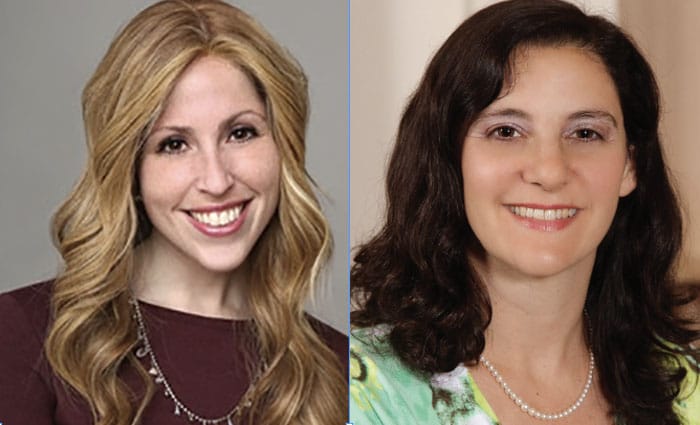 Rabbanit Alissa Thomas-Newborn and Rabbi Ilana Grinblat
Rabbanit Alissa Thomas-Newborn and Rabbi Ilana Grinblat Around 20 rabbis from across the religious spectrum convened on November 17 to make a commitment to learning more about mental health – for their own sake and the sake of their congregants. The event, “Briyut HaNefesh (Health of the Spirit): Mental Wellness Clergy Cohort,” was led by Rabbanit Alissa Thomas-Newborn of B’nai David-Judea Congregation
“We are meeting to build a network of clergy who are invested in mental health, who have an investment in self-care for themselves and those they serve,” Thomas-Newborn told the Journal.
The 250-member Board of Rabbis of The Jewish Federation of Greater Los Angeles and B’nai David-Judea are co-sponsoring the ongoing project.
“COVID has pushed the need for mental health support to the forefront of our minds and hearts,” Thomas-Newborn and the Board’s Vice President of Community Engagement Rabbi Ilana Grinblat said in a joint declaration. “Addressing this need is a crucial part of cultivating healing and wholeness going forward.”
They described their goal as building an interdenominational network of rabbis in L.A. who are invested in this holy work and can refer to and support each other. The rabbis plan to build Jewish mental health programming like Shabbatons, Torah learning groups and support groups, with the goal of amplifying sensitivity and education while reducing stigma.
“The cohort will also connect with interdisciplinary professionals and organizations in the field so that rabbis know where to turn when a congregant is in need,” they said. “They will feel supported as spiritual first-line responders.”
Grinblat told the Journal that Thomas-Newborn reached out to the Board of Rabbis about this project five months ago. “We were excited, because the goal of the Board of Rabbis is to support the rabbis,” Grinblat said.
She recalled that when Vice President of American Jewish University Rabbi Bradley Shavit Artson was working with the Board of Rabbis, he wrote a piece titled, “Who Heals the Healers?”
“That is the most distinct description of what the Board of Rabbis is for: You are healers for the community, and we are here to bring healing and support to one another,” said Grinblat.
Thomas-Newborn and Grinblat said the nearly two dozen committed rabbis will meet at least three times and receive ongoing virtual resources to implement at their discretion. Members have committed to run one mental health and wellness event in their communities in the coming year.
Thomas-Newborn told the audience, who were on Zoom and at Temple Beth Am, that she connected to the concept of the wounded healer.
Thomas-Newborn told the audience, who were on Zoom and at Temple Beth Am, that she connected to the concept of the wounded healer.
“Part of the work that we are going to do happens within ourselves, to be honest about how we face it,” she said. “The truth is, our world is very broken. Our hearts are very broken in many ways. I was speaking earlier with someone who said to me, ‘As a public leader, you must feel you have to keep it together all the time, make everyone feel it’s always good. That has to be really hard for you.’ I [said], ‘That’s not how I function.’ That would not be a healthy model for me. People would think I was lying. And I would be if I acted like everything always was fine.”
Despite the challenges rabbis and their congregants face nowadays, the rabbis are hopeful that they can make a positive impact on their communities.
“In good times, we build relationships with one another and give each other inspiration,” said Grinblat. “This is especially true in hard times when we need one another even more. During the 21 months of the pandemic, our support for one another has been more crucial.”























 More news and opinions than at a Shabbat dinner, right in your inbox.
More news and opinions than at a Shabbat dinner, right in your inbox.